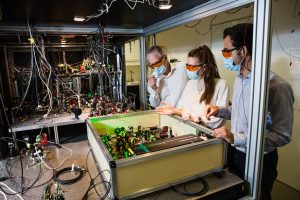Jean Dalibard receives the 2021 CNRS gold medal
Jean Dalibard (Bose-Einstein Condensates team of the laboratory) has received the 2021 CNRS gold medal, one of the most prestigious French scientific awards, for his pioneering work in ultra-cold quantum matter physics. Born in 1958, Jean Dalibard joined the CNRS in 1982 and has been a member of the French Academy of Sciences since 2004 and a professor at the Collège de France since 2012. He has developed within the Kastler Brossel laboratory a unique career as both an experimentalist and a theoretician.
Jean Dalibard’s research is at the heart of quantum physics: he is internationally recognized as one of the leaders in the field of quantum gases, particularly Bose-Einstein condensates, a particular state of matter at very low temperatures.
During his researches, he has specifically studied the properties of assembles of atoms that can be slowed or even “stopped” by lasers. Once slowed-enough, these atoms can be trapped in controllable spatial configurations for fundamental research or applications. His work has thus contributed to the emergence of quantum technologies, through the development and fundamental Study of trapped, b ut also through the proposal to use these ultra-cold atomic gases to create quantum simulators.
Among his most significant contributions, we can first mention conception of the magneto-optical trap, a tool to confine atoms while laser-cooling them. This tool has become essential for the hundreds of experiments on cold atoms that many laboratories around the world routinely carry out every day.
With his team, Jean Dalibard has also developed the theoretical method of Monte Carlo wave functions, now widely used by many scientists to simulate the behaviour of systems of atoms and photons in experimental situations.
His experiments on quantum vortices in cold atomic gases have opened a very active field of study of the superfluidity of these systems. These vortices allow to test, with adjustable and controlled parameters, concepts from condensed matter physics.
Finally, he is working on quantum simulation, an approach to use cold atomic gases to experimentally solve problems, inaccessible using usual computer calculations with reasonable computational power. The latter provides a promising platform to prepare and study complex quantum systems under perfectly controlled conditions, and thus to attempt to answer questions from solid state physics, nuclear physics and astrophysics.
Read the full press release of the CNRS and his portrait published in CNRS le Journal
Photo credit: © Frédérique PLAS/LKB/CNRS Photothèque
Crédit photo : © Frédérique PLAS/LKB/CNRS Photothèque

